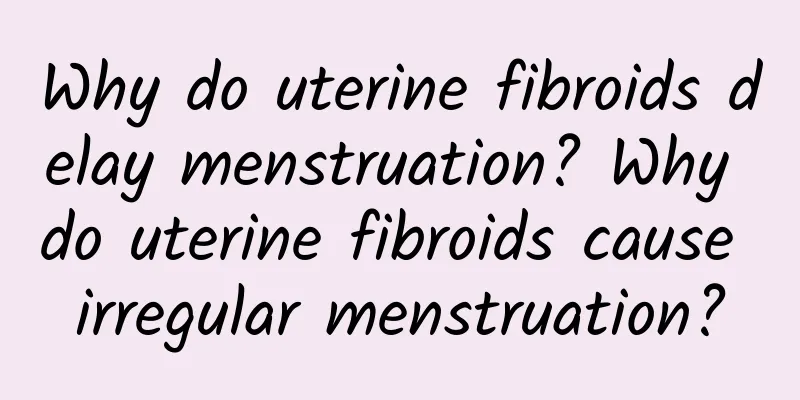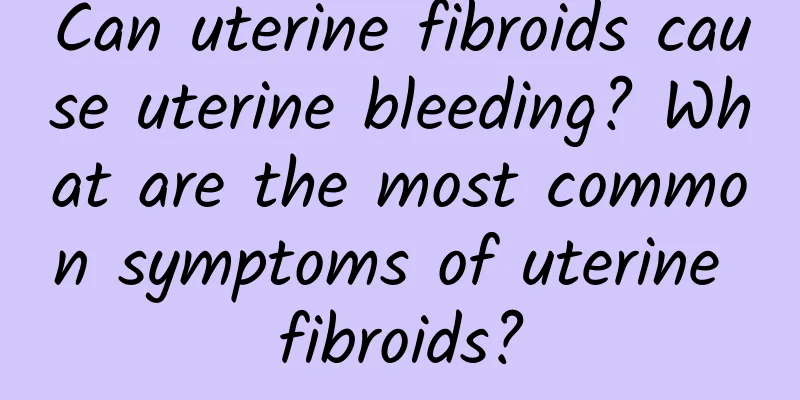Why do uterine fibroids delay menstruation? Why do uterine fibroids cause irregular menstruation?

|
Why do uterine fibroids delay menstruation? Why do uterine fibroids cause irregular menstruation? Uterine fibroids are a common benign tumor in women. They mainly originate from the smooth muscle cells in the endometrium and myometrium. Uterine fibroids usually do not cause symptoms, but in some cases, they may cause delayed or irregular menstruation. First, uterine fibroids can affect the normal growth and blood supply of the endometrium. The endometrium is a layer of tissue lining the uterus that gradually thickens and eventually sheds during the menstrual cycle, leading to menstruation. However, when uterine fibroids grow and press on the endometrium, it may interfere with the normal shedding process of the endometrium, causing menstruation to be delayed. Secondly, uterine fibroids may also cause abnormal contractions of the myometrium. The myometrium is the thickest layer of muscle tissue in the uterus, which is responsible for contracting during the menstrual cycle to expel the shed endometrium from the body. However, when uterine fibroids are present, it may interfere with the normal contraction of the myometrium, leading to irregular menstruation. In addition, the growth of uterine fibroids may also affect ovarian function. The ovaries are the key organs in the female reproductive system responsible for ovulation, and the normal occurrence of menstruation is one of the manifestations of ovarian function. The weight and pressure of uterine fibroids may interfere with the normal function of the ovaries, causing delayed or irregular menstruation. In general, uterine fibroids can affect the normal function of the endometrium, myometrium, and ovaries, which may lead to delayed or irregular menstruation. For women with uterine fibroids, if menstruation is abnormal, they should seek medical attention and treatment in a timely manner. Popular Science Introduction: Uterine fibroids are benign tumors that do not cause symptoms and do not require treatment in most cases. However, for some women with larger or more symptomatic fibroids, surgical treatment may be required. The surgery can be a traditional resection or a more advanced laparoscopic surgery or uterine artery embolization. The choice of treatment for uterine fibroids should be based on individual circumstances, so it is recommended that patients consult a doctor before deciding on a treatment method. Regular physical examinations are an important measure for the prevention and early detection of uterine fibroids. Female friends should maintain good living habits and seek medical treatment in time to protect their health. |
>>: What to eat after uterine fibroid surgery What to eat after uterine fibroid surgery
Recommend
Effective folk remedies for treating acute vaginitis
Effective folk remedies for the treatment of acut...
How to take care of cervicitis in daily life What are the symptoms of cervicitis in women
What should women do if they have cervicitis? Cer...
What is watery discharge after menopause?
Watery discharge after menopause may be a warning...
Grasp the key points of weight loss and increase basal metabolic rate
In daily life, many people are very concerned abo...
The cause of cervical hypertrophy is explained in detail
Patients with cervical hypertrophy all know that ...
Cold wave is coming! 3 tips for fish oil supplementation to protect your cardiovascular system! Nutrition professor: Do this to stay away from the number one killer
The first cold wave of winter is coming! The weat...
What are the physical characteristics of patients with acute ectopic pregnancy?
Acute ectopic pregnancy is a common clinical type...
Bad hygiene habits are most likely to induce candidal vaginitis
Candidal vaginitis can cause very shallow vesicle...
Can I prepare for pregnancy if I have pelvic inflammatory disease?
Can I prepare for pregnancy if I have pelvic infl...
What are the clinical manifestations of irregular menstruation?
Menstrual disorders, also known as irregular mens...
Amenorrhea cannot ignore psychological factors
When talking about amenorrhea, we often focus on ...
What tests are needed for chocolate cysts?
Chocolate cysts are a very common gynecological t...
What should women with habitual miscarriage do? Pay attention to these 5 points in daily life
Under what circumstances will pregnant women have...
Can abortion cause ovarian cysts? What are the prevention methods?
Can abortion cause ovarian cysts? Are there any p...
How to treat uterine fibroids? What are the treatments for uterine fibroids that preserve the uterus?
Uterine fibroids are the most common tumors of th...









